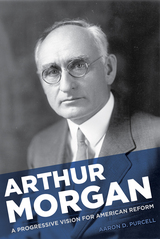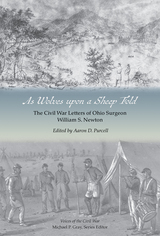

Purcell pinpoints Morgan’s reading of Edward Bellamy’s Looking Backward while a teenager as a watershed moment in the development of his vision for building modern American society. He recounts Morgan’s early successes as an engineer, budding Progressive leader, and educational reformer; his presidency of Antioch College; and his revolutionary but contentious tenure at the TVA. After his dismissal from the TVA, Morgan wrote extensively, eventually publishing over a dozen books, including a biography of Edward Bellamy, and countless articles. He also raised money to support an experimental community in Kerala, India, sharing Mahatma Gandhi’s belief in small, self-sustaining communities cooperatively supported by persons of strong moral character. At the same time, however, Morgan retained many of his late-nineteenth century beliefs, including eugenics, as part of his societal vision. His authoritarian administrative style and moral rigidity limited his ability to attract large numbers to his community-based vision.
As Purcell demonstrates, Morgan remained an active reformer well into the second half of the twentieth century, carrying forward a vision for American reform decades after his Progressive Era contemporaries had faded into obscurity. By presenting Morgan’s life and career within the context of the larger social and cultural events of his day, this revealing biographical study offers new insight into the achievements and motivations of an important but historically neglected American reformer.

William S. Newton (1823–1882) served the Union primarily as an assistant surgeon with the 91st Ohio Volunteer Infantry, but also spent a few months as acting surgeon with the 2nd Virginia Cavalry (US). Toward the end of the war, he was promoted to surgeon for the 193rd Ohio Volunteer Infantry. Newton’s units fought in the Appalachian Highlands, mostly in Virginia and West Virginia. He treated wounded soldiers after significant battles including Opequon and Cedar Creek. In May 1864, following the Battle of Cloyd’s Mountain, John Hunt Morgan’s Raiders captured Newton and other medical personnel. After three weeks, Newton and his fellow prisoners were given the option of either treating Confederate soldiers or going to Libby Prison; they chose the latter. Newton spent only three days at Libby Prison before being released, but the experience took a significant toll on his health.
The letters in this volume, addressed mostly to Newton’s wife, Frances, provide a window into fighting in the Appalachian borderlands, where the differences between battle, guerilla warfare, and occupation were often blurred. As a noncombatant, the doctor observed life beyond troop movements and the brutality of war. Newton’s detailed letters cover his living quarters, race relations, transportation and communication, the comfort of a good meal, and the antics of his teenage son Ned. This book provides new insights into the medical and social history of the war, the war in Western Virginia, local and regional history, the perspective of a noncombatant, life on the home front, and the porous lines between home and battlefront.


In Lost in Transition: Removing, Resettling, and Renewing Appalachia, Aaron D. Purcell presents a thematic and chronological exploration of twentieth-century removal and resettlement projects across southern Appalachia. The book shares complex stories of loss and recollection that have grown and evolved over time.
This edited volume contains seven case studies of public land removal actions in Virginia, Kentucky, the Carolinas, and Tennessee from the 1930s through the 1960s. Some of the removals include the Tennessee Valley Authority and the Norris Basin, Shenandoah National Park and the New River, the Great Smoky Mountains National Park, and the Keowee-Toxaway Project in northwestern South Carolina. Each essay asks key questions: How did governmental entities throughout the twentieth century deal with land acquisition and removal of families and communities? What do the oral histories of the families and communities, particularly from different generations, tell us about the legacies of these removals? This collection reveals confrontations between past and present, federal agencies and citizens, and the original accounts of removal and resettlement and contemporary interpretations. The result is a blending of practical historical concerns with contemporary nostalgia and romanticism, which often deepen the complexity of Appalachian cultural life.
Lost in Transition provides a nuanced and insightful study of removal and resettlement projects that applies critical analysis of fact, mythology, and storytelling. It illustrates the important role of place in southern Appalachian history. This collection is a helpful resource to anthropologists, folklorists, and Appalachian studies scholars, and a powerful volume of stories for all readers who reflect upon the importance of place and home.

They came from all corners of the country-fifteen young, idealistic, educated men and women drawn to Knoxville, Tennessee, to work for the Tennessee Valley Authority, one of the first of President Franklin D. Roosevelt's New Deal projects. Mostly holding entry-level jobs, these young people became friends and lovers, connecting to one another at work and through other social and political networks..
What the fifteen failed to realize was that these activities-union organizing and, for most, membership in the Communist Party-would plunge them into a maelstrom that would endanger, and for some, destroy their livelihoods, social standing, and careers. White Collar Radicals follows their lives from New Deal activism in the 1930s through the 1940s and 1950s government investigations into what were perceived as subversive deeds.
Aaron D. Purcell shows how this small group of TVA idealists was unwillingly thrust from obscurity into the national spotlight, victims and participants of the second? [not sure is it is needed] Red Scare in the years following World War II. The author brings into sharp focus the determination of the government to target and expose alleged radicals of the 1930s during the early Cold War period. The book also demonstrates how the national hysteria affected individual lives.
White Collar Radicals is both a historical study and a cautionary tale. The Knoxville Fifteen, who endured the dark days of the McCarthy Era, now have their story told for the first time-a story that offers modern-day lessons on freedom, civil liberties, and the authority of the government.
Aaron D. Purcell is an associate professor and director of special collections at Virginia Tech in Blacksburg
READERS
Browse our collection.
PUBLISHERS
See BiblioVault's publisher services.
STUDENT SERVICES
Files for college accessibility offices.
UChicago Accessibility Resources
home | accessibility | search | about | contact us
BiblioVault ® 2001 - 2024
The University of Chicago Press









